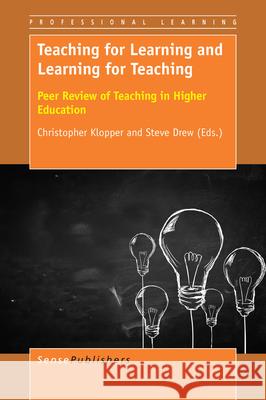Teaching for Learning and Learning for Teaching » książka
Teaching for Learning and Learning for Teaching
ISBN-13: 9789463002882 / Angielski / Twarda / 2015 / 282 str.
Teaching for Learning and Learning for Teaching
ISBN-13: 9789463002882 / Angielski / Twarda / 2015 / 282 str.
(netto: 419,90 VAT: 5%)
Najniższa cena z 30 dni: 425,63
ok. 30 dni roboczych.
Darmowa dostawa!
Teaching for Learning and Learning for Teaching focuses on the emerging global governmental and institutional agenda about higher education teaching quality and the role that peer review can play in supporting improvements in teaching and student outcomes. This agenda is a pervasive element of the further development of higher education internationally through activities of governments, global agencies, institutions of higher education, discrete disciplines, and individual teachers. Many universities have adopted student evaluations as a mechanism to appraise the quality of teaching. These evaluations can be understood as providing a "customer-centric" portrait of quality; and, when used as the sole arbiter of teaching performance they do not instil confidence in the system of evaluation by academic teaching staff. Providing peer perspectives as counterpoint, whether in a developmental or summative form, goes some way to alleviating this imbalance and is the impetus for the resurgence of interest in peer review and observation of teaching. This book seeks to recognise cases of peer review of teaching in Higher Education to affirm best practices and identify areas that require improvement in establishing local, national and international benchmarks of teaching quality.
Teaching for Learning and Learning for Teaching focuses on the emerging global governmental and institutional agenda about higher education teaching quality and the role that peer review can play in supporting improvements in teaching and student outcomes. This agenda is a pervasive element of the further development of higher education internationally through activities of governments, global agencies, institutions of higher education, discrete disciplines, and individual teachers. Many universities have adopted student evaluations as a mechanism to appraise the quality of teaching. These evaluations can be understood as providing a "customer-centric" portrait of quality; and, when used as the sole arbiter of teaching performance they do not instil confidence in the system of evaluation by academic teaching staff. Providing peer perspectives as counterpoint, whether in a developmental or summative form, goes some way to alleviating this imbalance and is the impetus for the resurgence of interest in peer review and observation of teaching. This book seeks to recognise cases of peer review of teaching in Higher Education to affirm best practices and identify areas that require improvement in establishing local, national and international benchmarks of teaching quality.











